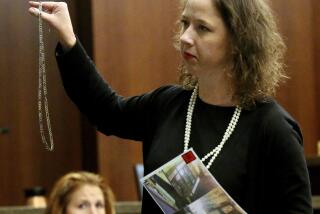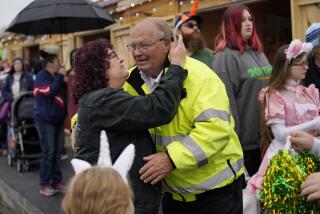In Brunswick, Georgia, residents reflect on the shooting of Ahmaud Arbery
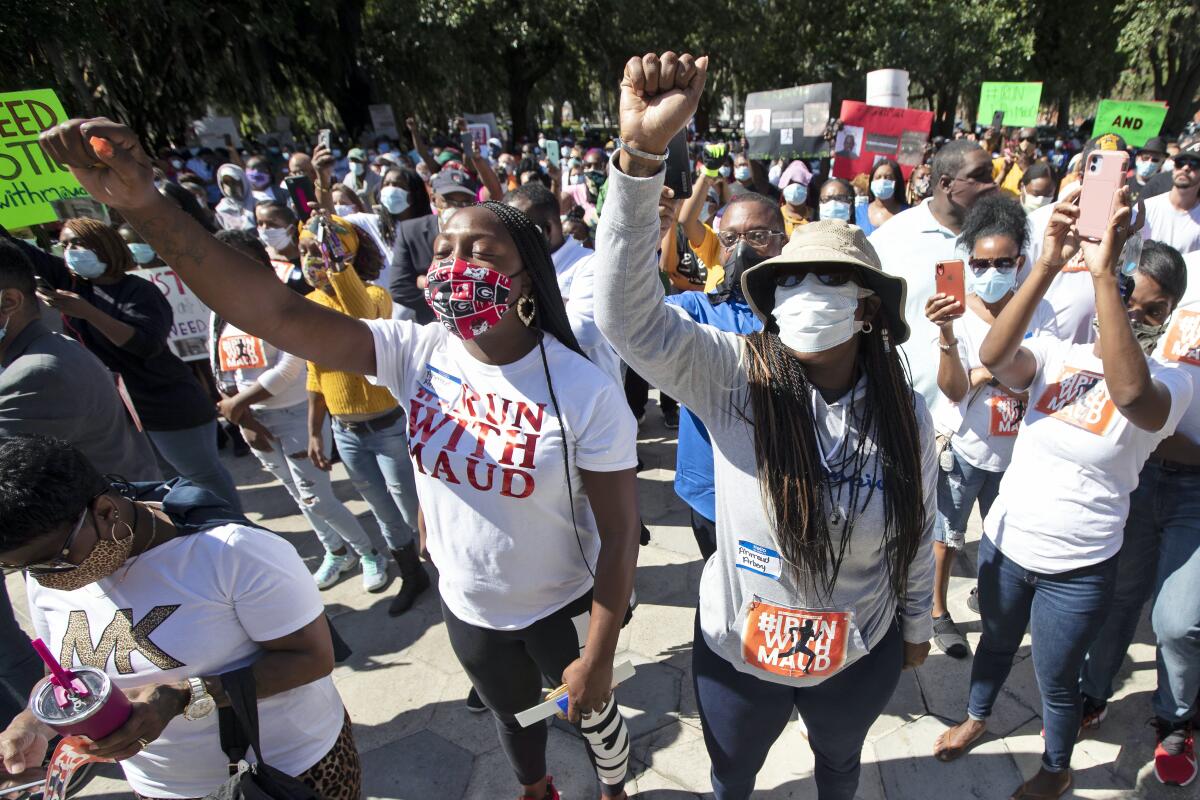
BRUNSWICK, Ga. — As a longtime NAACP foot soldier in this small Southern port city, Robert Griffin has witnessed his share of civil rights struggles.
In the early 1960s, when Griffin tried to place an order at the front window of a Dairy Queen, where whites typically lined up, the owner met him with a butcher’s knife.
In 1965, when he bought a house in a white neighborhood, the sheriff instructed him to make sure his family slept in the back room just in case the house was firebombed.
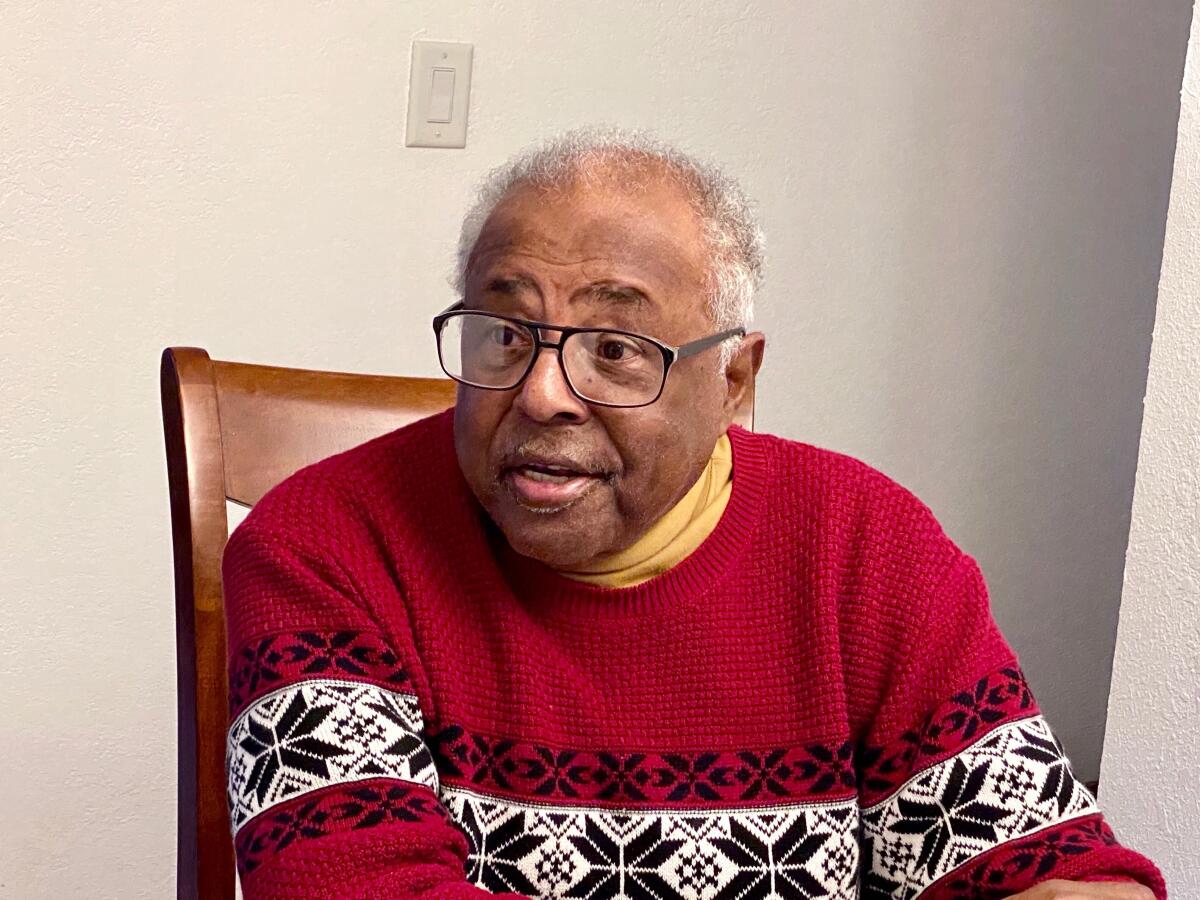
And when the city’s racially segregated high schools merged in 1970, he and other staff would go out into the school parking lot to monitor black and white students who kept chains and baseball bats in their car trunks.
On Friday morning, the 82-year-old retired teacher and former NAACP community organizer was among hundreds outside the Glynn County Courthouse in downtown Brunswick to call for justice for Ahmaud Arbery, a 25-year-old black man who was chased by two white men and shot dead as he jogged along a suburban street.
“It was blatant murder,” Griffin said before the rally. “This, to me, is a form of lynching.”
The Georgia Bureau of Investigation charged Gregory McMichael, 64, and his son Travis McMichael, 34, with felony murder and aggravated assault Thursday evening — over 10 weeks after the Feb. 23 incident — after mounting national criticism of local prosecutors’ handling of the case.
For many Americans, Arbery’s killing harks back to the old Jim Crow days, when white mobs hunted down black men and killed them with impunity. In Brunswick, a blue-collar coastal city of 16,000 residents, where 56% are black and over a third live in poverty, the shooting has sparked an uneasy conversation about race, power and privilege.
While some black residents say they are not surprised by the shooting, Griffin sees the killing as more of an aberration for this south Georgia town than part of an ongoing pattern of racial violence. Over the decades, he said, the city has integrated more smoothly than surrounding towns, with activists working with city leaders to prevent friction.
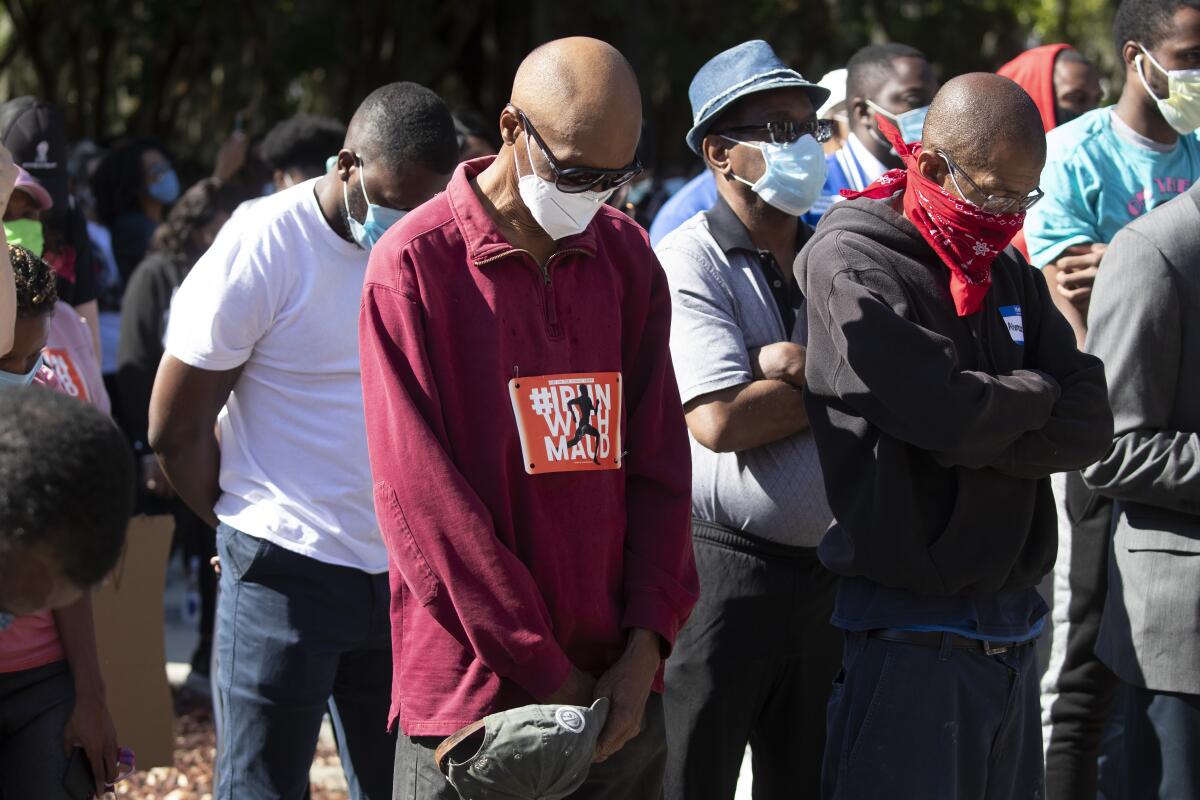
“This is an isolated thing, and it could have happened anywhere in America, really,” Griffin said. “This is a very peaceful community, open to everybody, but racism is never gonna go away. I’ve been working on it all my life.”
Arbery was running in the predominantly white Satilla Shores neighborhood when he was pursued by Gregory McMichael, a white former police officer and retired investigator with the local district attorney’s office, and his son Travis. They were armed with a shotgun and a .357 magnum.
A video shared widely this week on social media shows a black man jogging along a two-lane residential street when he comes upon a white pickup. A man stands beside the truck’s open driver’s side door, while another man stands in the truck bed.
After running around the truck on the passenger side, the jogger disappears briefly from view. As a shot rings out, he crosses in front of the truck and tussles with the man on the driver’s side over what appears to be a shotgun or rifle. A second shot rings out, and the jogger wrestles with the man. A third shot is fired at point-blank range before the jogger stumbles to the ground.
Many in Brunswick, which in 2014 swore in its first African American mayor, are angry that local law enforcement did not act more quickly to arrest the McMichaels.
When officers with the Glynn County Police Department arrived at the scene of the shooting, they found a man on the ground “bleeding out” and Gregory McMichael, a former police officer, with blood on his hands. After McMichael told police there had been several recent break-ins in the neighborhood and the suspect had been caught on videotape, they let him and his son go home and filed a brief incident report that recounts only the elder McMichael’s account of what happened.
Demetris Frazier, 26, a cousin and childhood friend of Arbery’s who played football with him at Brunswick High School, said he was well aware of police brutality and the spate of black men who have been killed in recent years, but to see it happen in his hometown, to somebody so close to him, was devastating.
“Never in a million years would I think that it would happen to Ahmaud,” he said.
While many black residents and activists said they were excited about the arrests, they were also cautious after so many shooters of black men, like Trayvon Martin, had been acquitted.
John Perry, senior pastor of Mount Sinai Missionary Baptist Church and president of the Brunswick NAACP, said activists would continue to push for a third man who followed the McMichaels’ truck and captured the video footage to be arrested too.
“He aided and abetted in the murder of Ahmaud from the video footage,” he said. “They had Ahmaud trapped like they were hunting an animal.”
Beyond the trial, he added, activists planned to scrutinize why local law enforcement took so long to make an arrest.
Last month, a local prosecutor from a neighboring jurisdiction spent more than a month on the case until he ceded to the Arbery family’s complaint that he had a conflict of interest: His son worked in the prosecutor’s office where McMichael used to work.
Before he left the case, George E. Barnhill, the district attorney of the Waycross Judicial Circuit, said there was insufficient probable cause to arrest the McMichaels, arguing that they had acted legally under the state’s citizen arrest and self-defense statutes.
Standing outside the courthouse with daughter Jazmine, 20, and son Jonathan, 13, Jennifer Richardson, 45, said she wanted to honor Ahmaud and protect her own children.
“This could be Ahmaud,” she said, gesturing to Jonathan.
When she first heard of Arbery’s death, Richardson immediately thought of a 2019 hit-and-run incident on nearby St. Simons Island. A wealthy white teenager behind the wheel of a car struck a black teenager, Rilyn Ellis, leaving him on the side of the road with a fractured neck and broken leg.
After posting a $50,000 bond, the white teenager was released.
“His father paid a fine, and he was let go,” Richardson said. “Brunswick is known as a country boy circle. Generations after generations go into the same [elected] positions.”
Yet despite her criticism of the monied families that live in lavish homes on St. Simons and Sea Island, Richardson was hesitant to complain of racial divides in Glynn County.
Ultimately, she hoped Arbery’s case would not revolve around race. It would be difficult, she said, to prove Gregory and Travis McMichael’s motivation.
Latrevia Ross, 51, a mental health technician at Saint Simons by-the-Sea hospital, said after Arbery’s death, “you almost get scared to walk in the neighborhood.”
She was not surprised when she heard of the shooting.
“It always happens like this in Brunswick,” she said. “It’s our word against theirs,” she said. “And everyone is going to believe theirs.”
Others, though, took pains to note that the McMichaels did not represent the community at large. Perry said many white residents of Satilla Shores were appalled by the violence that took place in their community.
“There are people within that neighborhood that have stood up and say, we know the McMichaels, but we are totally against what they did,” he said. “The community across all racial lines are standing together and declaring that something needs to be done. In any community, you have the climate of the vast majority versus those isolated experiences. And I believe that that was an isolated experience.”
For Perry, part of the problem was that the McMichaels had ties with law enforcement — connections that extended them privileges and allowed them to evade the law.
“At the least, they gave them the benefit of the doubt; at the worst, they tried to help them to cover up an incident that was clearly murder,” Perry said of local law enforcement officers and prosecutors. “So, there is this whole relationship of privilege that we’ve got to address in our legal system and our law enforcement system.”
For Griffin, it is not a new battle.
When he moved to Brunswick in 1961 to work as a band director at the local black high school, there were die-hard racists in positions of power. When activists tried to integrate Brunswick’s whites-only swimming pool, the city manager told them he’d rather fill the pool up with dirt than let blacks and whites mix.
“And that’s what they did,” Griffin said. “He filled that big Olympic pool up with dirt and said, ‘The Atlantic Ocean has enough water for all of us.’”
But for every white supremacist who resisted integration, he said, there were white leaders willing to work with activists. Once a week, the NAACP’s executive board would secretly enter the back door of a St. Simons Island bank to discuss with white leaders how they would desegregate the bowl arena, the swimming pool, the casino.
Some white business leaders would also give them cash registers to train young black residents how to use them so they could work as cashiers.
One night, Griffin said, the leader of the NAACP branch, the Rev. Julius Caesar Hope, got a call from the police chief in the middle of the night saying officers had just trapped three young black men in a dark alley after they robbed a Jiffy Mart.
The chief asked Hope to coax the men out without violence. So Griffin and Hope hustled over to the alley with a flashlight and urged the men to drop their loot and walk out with them.
“I don’t know of a police chief anywhere in America who would have done that,” Griffin said. “That would have been like a turkey shoot for the average police department.”
In that sense, he said, the town had been something of a model for race relations, a city where black activists worked with white leaders to resolve friction and made national news for its successful desegregation efforts.
Compared with nearby cities like Savannah, Albany and Jacksonville, he said, there was little bloodshed.
“Instead of just jumping out there, organizing and putting a picket sign in front of one of your local stores, we would talk to the manager first,” he said. “And that’s how we achieved what we did in Brunswick, and we all proud of it.”
Still, in his advanced age, as he watched the shootings of black men across the U.S. on TV, Griffin said he felt himself becoming more militant.
“It used to be a fiesta for some police departments, you see, but we haven’t had that experience here,” he said. “I wouldn’t put up with it myself. I would organize a vigilante group and put an end to that.”
Special correspondent Clare Busch reported from Brunswick, Ga., and Times staff writer Jenny Jarvie from Atlanta.
More to Read
Sign up for Essential California
The most important California stories and recommendations in your inbox every morning.
You may occasionally receive promotional content from the Los Angeles Times.
